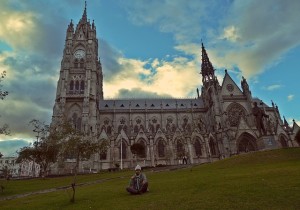The Poetry of Ecuador
Ecuador, a country known for its lavish beauty, yet it’s stricken by economic heartache and poverty. It comes as no surprise that some of the most influential poets from the 20th century were born in Ecuador. Much like their country, the poets range from the elite upper class to the impoverished lower class each with their own unique story to tell.
 Some of the first known poets from Ecuador date back to the 1900’s and most likely from before. Medardo Angel Silva lived from 1898 to 1919. He was an Ecuadorian poet who wrote with a great deal of passion and suffering. Silva was troubled by his low economic standing. It was this worriment of poverty and the hypocrisy of society that helped shape his ideals. One of Silva’s most famous works, El Arbol Del Bien y Del Mal, depicts Silva’s continuous contemplation with life and death.
Some of the first known poets from Ecuador date back to the 1900’s and most likely from before. Medardo Angel Silva lived from 1898 to 1919. He was an Ecuadorian poet who wrote with a great deal of passion and suffering. Silva was troubled by his low economic standing. It was this worriment of poverty and the hypocrisy of society that helped shape his ideals. One of Silva’s most famous works, El Arbol Del Bien y Del Mal, depicts Silva’s continuous contemplation with life and death.
Silva was well-known for his position in La Generación Decapitada, also known as ‘Decapitated Generation.’ The group consisted of four Ecuadorian poets who were given the name La Generación Decapitada due to the fact that they had all died of suicide at a young age; although, the question has never been truly answered if Silva did in fact commit suicide or if he had been killed in a lover’s quarrel.
Another influential Ecuadorian poet of the 20th century is Jorge Carrera, 1903-1978. Carrera came from a prominent family. He was rich in culture and fortunate in his travels. Carrera wrote in many different styles, but was most recognized for his ultraism style of poetry. Carrera had an astounding talent for his use of metaphors, which he used to describe his travels.
Karina Galvez born in Guayaquil, Ecuador, 1964, is known for her historical, socio-political and romantic poems. Galvez now resides in California where she is a songwriter, poet, and T.V. host reporting on arts and culture. Galvez has written and published her own book, Karina Galvez-Poetry and Song.
Today Ecuador is still an impoverished country full of beauty and majestic scenery. Most of the poets from Ecuador talk of the beauty of their home, the distressed poverty of their country, and how difficult it is to move up in the economic ladder. There are few jobs in Ecuador and as a result of the low education within the country, it is hard for upcoming generations to get employment and excel. The youth has much to say and their voices are being heard through the use of poetry. We will see what the future may bring forth as the world becomes more global and engulfed within each other’s cultures.




